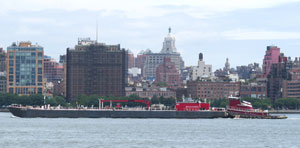The U.S. Coast Guard has suspended the rulemaking process for establishing new Hudson River barge anchorages to conduct an additional assessment of the waterway.
While some environmentalists and public officials are celebrating the decision as a victory that they believe is the death knell of the plan, it’s clear from the Coast Guard announcement that the process will continue, even if additional anchorages are not approved at its conclusion.
The controversial proposal from the shipping industry would create 10 commercial shipping anchorages on the Hudson from Yonkers north to Kingston, N.Y.
After receiving more than 10,000 comments from industry leaders, public officials, environmental groups and members of the public, the Coast Guard announced on June 28 that it was halting the anchorage review process to conduct a formal risk identification and evaluation of the river, known as a Ports and Waterways Safety Assessment (PAWSA).
The comments came in response to the service’s 2016 advance notice of proposed rulemaking (ANPRM) aimed at seeking public input and examining whether there is a need for a proposed rule on new anchorage grounds on the Hudson to promote safe navigation. An ANPRM is an optional, pre-rulemaking tool for seeking information from the public.
After reviewing the comments, Rear Adm. Steven Poulin, commander of the 1st Coast Guard District, suspended the rulemaking process and ordered a PAWSA. The PAWSA will identify major waterway safety hazards, estimate risk levels, evaluate potential mitigation measures, and set the stage for implementation of selected measures to reduce risk.
In the fall, at a date to be announced later, a group of waterway users and others with an interest in the issue will participate in a two-day workshop to ensure the PAWSA process is conducted properly, the Coast Guard said.
“The results of the PAWSA will help us determine what the next steps might be, after a more comprehensive assessment of risks,” Poulin wrote in a prepared statement after the initial announcement. “Any subsequent rulemaking regarding maritime commerce on the Hudson River will continue to be conducted through a transparent process of public notice and comment.”
The anchorages were proposed last year with the backing of the Maritime Association of the Port of New York and New Jersey.
“The anchorages are necessary for safety,” said Edward Kelly, the trade group’s executive director. “We need safe places to anchor and get out of the navigational stream in the case of limited visibility, crew fatigue or heavy ice floes.”
Opponents insist the anchorages would increase the odds of a fuel spill, create visual blight and interfere with waterfront development.
The public officials opposed to the anchorages hailed the suspension of the rulemaking process and predicted the proposal was dead.
“I am glad the Coast Guard has come around to our way of thinking,” said state Rep. Sean Patrick Maloney, who proposed legislation to sink the anchorage plan and called the Coast Guard decision a “major victory.”
“Our river is a national treasure that should be preserved and protected for generations — not turned into a parking lot for commercial oil ships,” he said.
Andy Bicking, director of public policy for Scenic Hudson, wrote on the environmental group’s website that the Coast Guard’s announced assessment “does not effectively eliminate the proposal to anchor many more crude-oil barges on the Hudson. It creates a structured process for evaluating the potential need for anchorages and their risk to the public, the environment and our communities. This is a significant achievement.”
Kelly, however, insisted that “it’s just another step in the process.” With more than 10,200 comments submitted, “we fully expected that the Coast Guard would have to take another step. We are fully in favor of moving ahead with a PAWSA because it’s all fact-based, and they are very thorough. If the facts in this case do come out, we will clearly prevail.”
He added that “we hope this will dispel a lot of the nonsense that has been propagated.” Chief among the criticisms are that the anchorages “will become parking lots for crude oil. The cost to stockpile oil on the river with the attendant tug and crew is so cost-prohibitive.”
Kelly also disputed that the anchorages would harm the river’s population of endangered sturgeon. He said a study conducted by the Hudson River Foundation, the New York State Department of Environmental Conservation and the University of Delaware dispelled that threat.

